The United Arab Emirates (UAE)
The aim of this blog is to give solo travelers, group travelers and couples an insight into the United Arab Emirates so that they can plan their trips to this fascinating country accordingly. While some people doubt the rules or have inhibitions about the culture or religion, after 1.5 years of working in the UAE, I would like to give you an honest overview and try not to hide with facts.
Table of contents:
1.) The UAE at a glance
2.) Is UAE tolerant?
3.) Is UAE safe?
4.) Is UAE expensive?
5.) Can I get alcohol and pork meat?
6.) Is there prostitution/drugs in UAE?
7.) What rules apply in the UAE?
8.) What is the food like in the UAE?
9.) History and illusion – what to expect?
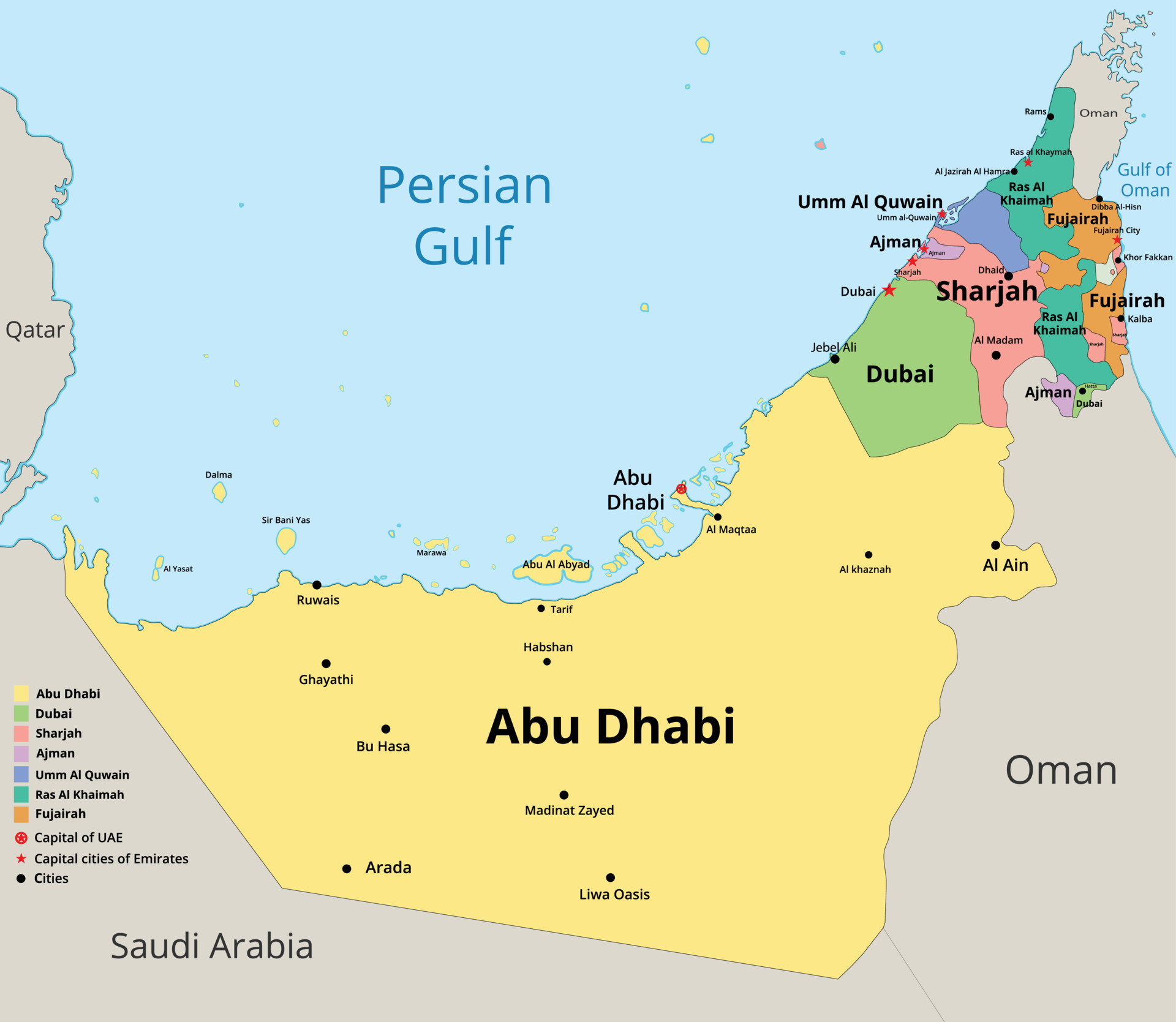
Out of a population of about 10.2 million people (2023), about 9 million (88.5%) are expatriates, although the official language is Arabic but English is widely spoken throughout the country. Most expats come from India, followed by Pakistan, Bangladesh and the Philippines.
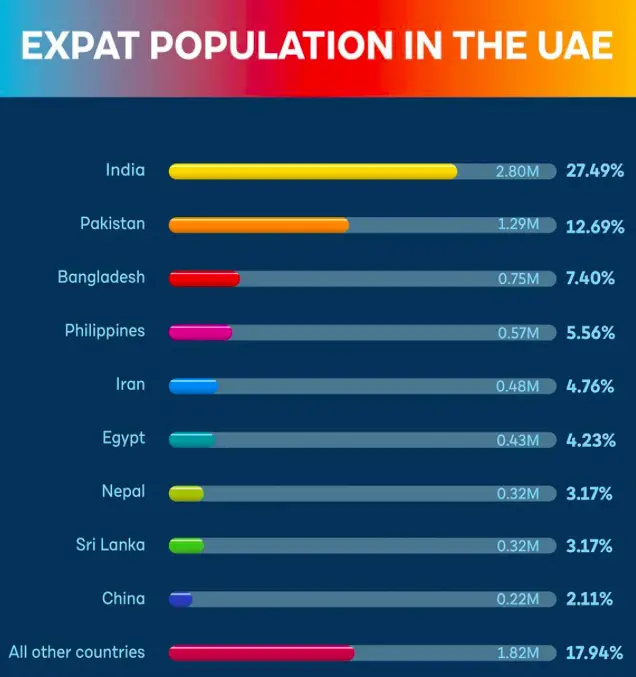
The gender distribution between men and women is 68.5% to 31.5%, which can be explained by the fact that most employees are male expatriates.
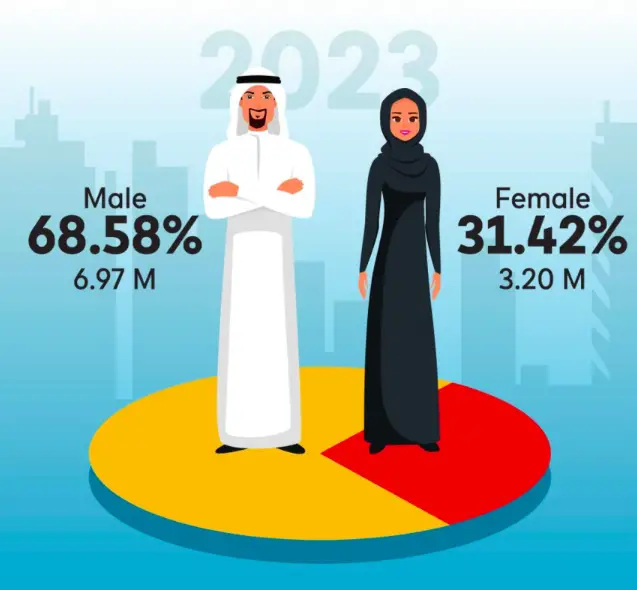
The tourism sector is the most successful among the Gulf states with many spectacular buildings and world records. It offers desert safari tours for tourists away from the crowded cities, while in the eastern parts of the UAE, the Hajar Mountains provide a perfect backdrop for trekking and other adventurous activities.
2.) Is UAE tolerant?
It is known that the UAE is an Islamic country with about 77% of people practicing this Islam. Due to the emigrants, there are also other religions such as Hindus and Buddhists (~10%), Christians (~9%) and other religions. In other words, in addition to mosques, there are also various churches and synagogues in the UAE. However, it is worth mentioning that the Abrahamic Family House in Abu Dhabi is an interfaith residential complex that includes a mosque, a church and a synagogue. In addition, the special cube shape (30 by 30 meters) of this complex is intended to promote tolerance and understanding between different religions.

3.) Is UAE safe?
According to NUMBEO the UAE is the second safest country in the world after Qatar and ahead of Taiwan. It can be said that UAE is definitely a safe place to live, work and travel for men and women. However, that doesn’t mean there is no crime. People should use common sense to avoid obvious risks when they feel uncomfortable walking on a certain street at a certain time or getting into a taxi when it doesn’t suit them. The risk of becoming a victim of pickpocketing is relatively low, but it is advisable to protect your belongings and keep an eye on them. In the UAE there are many tourists who behave differently than the residents. For the residence permit holders, also known as expats, they would most likely not commit crimes as they would be blacklisted (entry ban) by the GCC countries and also lose their jobs.
Especially for female tourists, female solo travelers or in a female group > there is a real possibility that some expatriate groups can annoy you with staring, taking photos, filming… This mostly happens near the corniches where some people gather and hang out to watch a few tourists. I have heard a few stories of the female tourists feeling uncomfortable in this situation and have experienced it myself.
However, what is common here in the United Arab Emirates are telephone scams. I experienced it myself when supposedly the police call you about money laundering and have to check your bank and credit cards. Although we have learned that credit card details are never shared, this scam works quite often because the scammers work as a team and are very rude. The police will never ask for bank details, but for some expats this information comes too late.
4.) Is UAE expensive?
Generally the answer is YES > but really it’s a matter of perspective. Of course, you can live a luxury life, stay in the best hotels in the world, eat in the most expensive restaurants, do lots of activities and buy lots of things. Therefore, we consider the average income in the UAE, which is 16,500 dirhams per month (~4500 USD). That sounds okay, but of course that doesn’t apply to everyone. According to Wagecenter, the minimum wage is between 600 and 3000 dirhams per month, which is approximately $165 to $815. And believe me, there are many expats making money in this field, especially workers or maids. They either share an apartment/room with other people to minimize costs or have various packages where the company provides accommodation and transportation free of charge.
So the expats have their own society, shops and restaurants all over the UAE and these places offer you cheap meals or services (hairdresser, barber, grocery store, accommodation, etc.). The UAE offers you a wide choice of first-class hotels with first-class services, but it is up to you to choose it or not. There are many good hotels with an average price between 50 and 100 USD per night, including breakfast and sometimes dinner. If you want to travel on a budget, check out some hostels in Dubai or Abu Dhabi.
The means of transport such as subway, buses or taxis are cheap and affordable and offer very good services. It’s a good idea to try different airports if you want to save some money. Abu Dhabi is generally cheaper than Dubai and it takes around 1.5-2 hours by bus from Abu Dhabi Airport to Dubai. Depending on the airline, transportation is offered free of charge.

5.) Can I get alcohol and pork meat?
Alcohol is often available in licensed restaurants or bars and can mainly be found in hotels. It is also possible to purchase alcohol in “bottle shops” where no license or permit is required. This has happened in the past and is still a problem in other countries such as Oman. However, in the UAE, you can just go to a bottle shop and get the alcohol you want. Drinking alcohol in public is prohibited unless you are in a hotel, bar or restaurant. Otherwise, you should take it home and drink it there. NOTE: Alcohol is banned and illegal in the Emirate of Sharjah. Hotels are not allowed to serve you alcohol.
Pork is available in numerous grocery stores such as Waitrose, Spinneys (not all), Choithrams, Al Maya (and some smaller stores) and in some restaurants such as Ernst Biergarten in Dubai, McGettigan’s (Dubai, Abu Dhabi, Al Ain, Fujairah), Little Bavaria in Umm Al Quwain and many, many more….
6.) Is there prostitution/drugs in UAE?
Prostitution is illegal in the UAE – so far so good. However, the oldest business in the world is also part of the “business” here in the UAE. Some hotels, bars or massage establishments employ predominantly women from countries such as China, India, Nepal, Nigeria, Vietnam, the Philippines, etc., where they provide services. Not only, but also in some parts of Dubai like Deira or Burj Dubai and Hamdan Street in Abu Dhabi, you can find some businesswomen walking up and down the street. There are also some Telegram groups where mostly Russian ladies provide incall and outcall services for around $200-400 per hour. If you walk near the hotels, you may also see some business cards on the floor or on the car door where ladies offer “massages”. When you call the number (there are some videos on YouTube), an Indian guy usually coordinates the time and the girls with the service they offer. It must be understood that behind this business there are also people who want to cheat or rob you. By the way, there is also male prostitution in the cities.
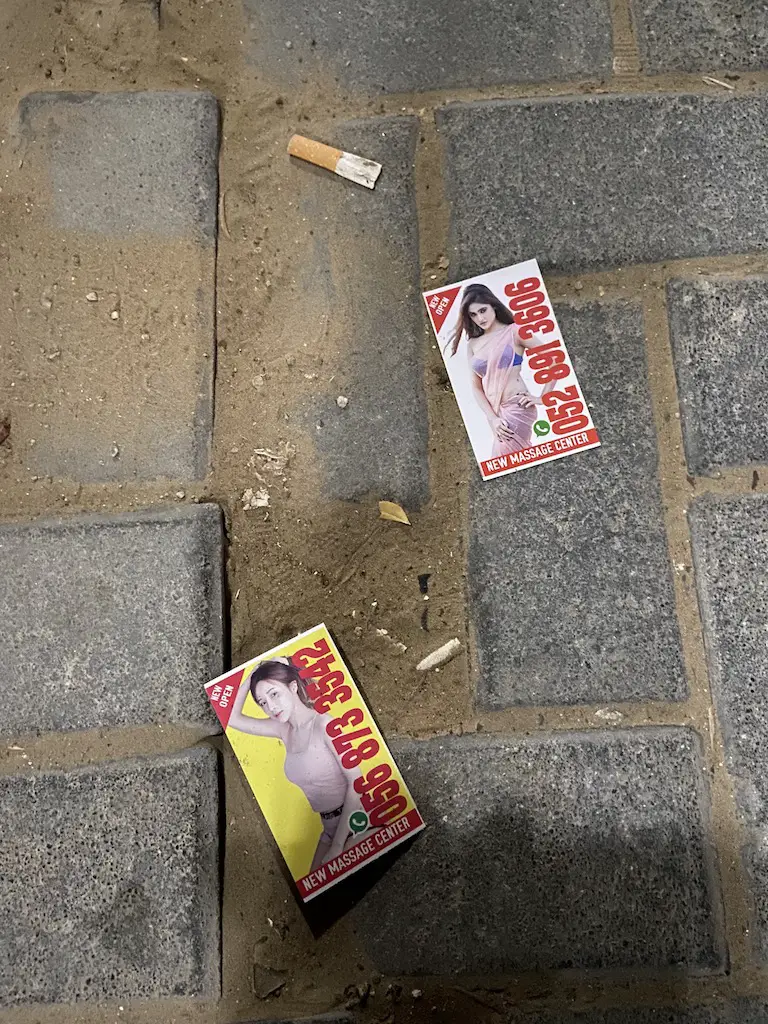
Drugs are absolutely forbidden and of course illegal, however the UAE police often arrest people for smuggling drugs into the UAE. A well-known route leads from Iran via Musandam to Oman and then on to the United Arab Emirates. Although drugs are available in the UAE, no one should risk being arrested and deported. The UAE is definitely the wrong country to play around with.
7.) What are the rules in the UAE?
As already mentioned, the UAE is a tolerant country where different people with different cultures and religions are respected. But remember: while you are in a foreign country, you should know some general rules in the Emirates. While some emirates are more tolerant than others, it is advisable to follow some general rules such as:
– Do not drink alcohol in public
– Don’t kiss around in public
– Holding hands in public is not common, but in Dubai I saw a lot of people and no one complained about it
– Wear appropriate clothing when walking around. Some conservative Emiratis are offended when women dress very short. Long dresses are a must, especially in some public places (mosque, museum, some hotels > Abu Dhabi etc…)
– Taking photos of people without permission can lead to misunderstandings and, in the worst case, a crime (ok, this has never happened to me > but keep in mind)
8.) What is the food like in the UAE?
Depending on your taste and willingness to try different cuisines, you must try local dishes. Emirati cuisine is known for its lamb and mutton dishes (Lamb Ouzi), as well as various types of rice, hummus and many traditional sweets. The best way to find authentic Emirati restaurants is on Google Maps, try different foods and if you really like it, sign up for a cooking class in Dubai or Abu Dhabi.
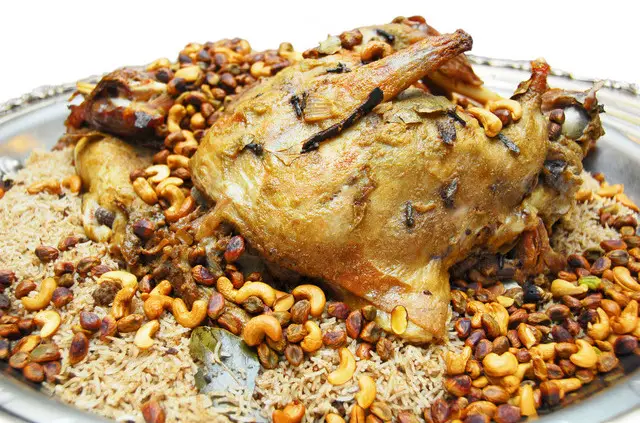
Lamb Ouzi
Emiratis also love chicken, especially fast food chains like KFC, McDonalds, Pizza Hut and many more. It’s completely normal to go out to dinner at 10 or 11 p.m., and if you’re still hungry you can usually grab something to eat until 4 a.m. Besides all the delicious Italian, Thai, German, Chinese, French etc. restaurants, almost all malls have food courts where you can dive in and find your favorite food.
Side note: Try the Brazilian steakhouse Texas De Brazil, which offers an all-you-can-eat buffet and the best fresh meat you can get. It is available in Dubai at Dubai Mall, Mall of Emirates and in Abu Dhabi at Yas Mall.
9.) History and illusion – what to expect?
When I first traveled to Dubai 12 years ago, I was amazed by the architecture, the high-rises and the vision of becoming a top tourism destination. On the other hand, something was still missing, the culture, the atmosphere that makes a city so enchanting. In my opinion, that definitely doesn’t exist here in Dubai. It’s about money and this is clearly visible in the real estate market, where prices are rising and slowly becoming unaffordable for middle class society. On the way to work and back, the car is almost the only way to get around. Yes, there are buses and in Dubai there is also a metro (2 lines > which connects to Dubai Airport DXB). But the metro doesn’t cover all of Dubai, the tram in Dubai only goes around Marina Beach and the buses don’t go everywhere either. This leads to a lot of traffic jams in Dubai as Dubai builds one skyscraper after another. I’m not so sure what kind of infrastructure program Dubai or the UAE will have in the future, but it will be a big challenge in terms of zero-emission transport. To be fair, the state railway company ETIHAD Rail is currently building a railway network that will connect East and West as well as the South in various stages. And yes, a metro system is planned in Abu Dhabi – but so far the cities are growing and the infrastructure is not as good as it should be. Still, the UAE is worth a visit > check out my blog TOP 22 BEST PLACES TO VISIT IN UAE

